Rapid Response to Public Health Article: Historical Context
VerifiedAdded on 2022/08/17
|7
|1362
|15
Report
AI Summary
This report is a rapid response to a journal article, analyzing the impact of historical factors on the health of indigenous Australians. The assignment, fulfilling the requirements of PUBH610, focuses on the significant role of historical events such as segregation, child removal, racism, and social disadvantage in disempowering indigenous communities and adversely affecting their health outcomes. The report references key studies, including those by Shepherd et al. (2017) and the Australian Institute of Health and Welfare (2017), to illustrate how racial discrimination, historical trauma, and socioeconomic factors contribute to poor mental and physical health. It highlights the persistent effects of historical injustices, the importance of recognizing historical parallels, and the need for human rights-based policy approaches to eliminate systemic racism and promote the well-being of indigenous Australians. The conclusion emphasizes the continued relevance of these historical influences on health outcomes and calls for active governmental responses.
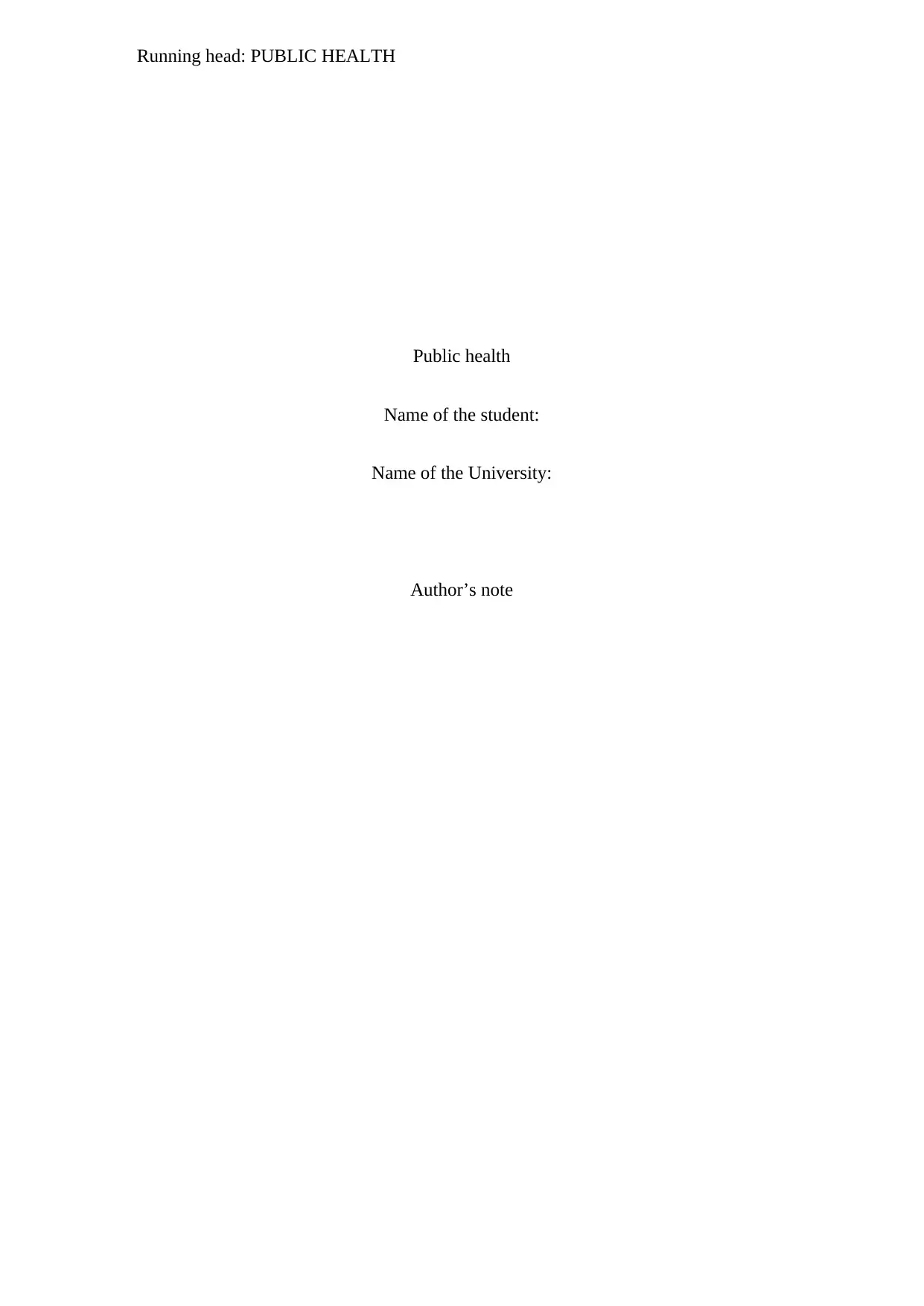
Running head: PUBLIC HEALTH
Public health
Name of the student:
Name of the University:
Author’s note
Public health
Name of the student:
Name of the University:
Author’s note
Paraphrase This Document
Need a fresh take? Get an instant paraphrase of this document with our AI Paraphraser
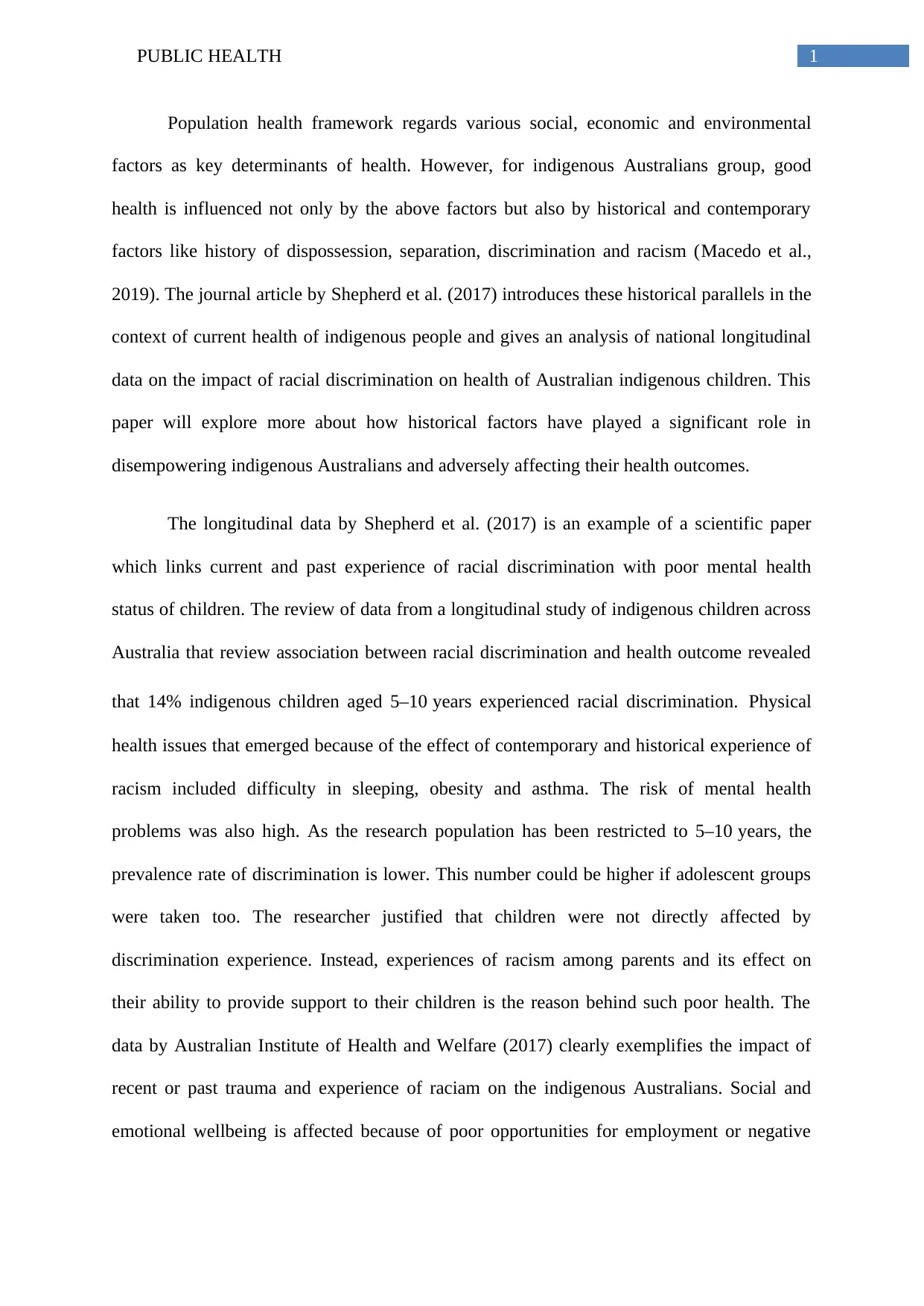
1PUBLIC HEALTH
Population health framework regards various social, economic and environmental
factors as key determinants of health. However, for indigenous Australians group, good
health is influenced not only by the above factors but also by historical and contemporary
factors like history of dispossession, separation, discrimination and racism (Macedo et al.,
2019). The journal article by Shepherd et al. (2017) introduces these historical parallels in the
context of current health of indigenous people and gives an analysis of national longitudinal
data on the impact of racial discrimination on health of Australian indigenous children. This
paper will explore more about how historical factors have played a significant role in
disempowering indigenous Australians and adversely affecting their health outcomes.
The longitudinal data by Shepherd et al. (2017) is an example of a scientific paper
which links current and past experience of racial discrimination with poor mental health
status of children. The review of data from a longitudinal study of indigenous children across
Australia that review association between racial discrimination and health outcome revealed
that 14% indigenous children aged 5–10 years experienced racial discrimination. Physical
health issues that emerged because of the effect of contemporary and historical experience of
racism included difficulty in sleeping, obesity and asthma. The risk of mental health
problems was also high. As the research population has been restricted to 5–10 years, the
prevalence rate of discrimination is lower. This number could be higher if adolescent groups
were taken too. The researcher justified that children were not directly affected by
discrimination experience. Instead, experiences of racism among parents and its effect on
their ability to provide support to their children is the reason behind such poor health. The
data by Australian Institute of Health and Welfare (2017) clearly exemplifies the impact of
recent or past trauma and experience of raciam on the indigenous Australians. Social and
emotional wellbeing is affected because of poor opportunities for employment or negative
Population health framework regards various social, economic and environmental
factors as key determinants of health. However, for indigenous Australians group, good
health is influenced not only by the above factors but also by historical and contemporary
factors like history of dispossession, separation, discrimination and racism (Macedo et al.,
2019). The journal article by Shepherd et al. (2017) introduces these historical parallels in the
context of current health of indigenous people and gives an analysis of national longitudinal
data on the impact of racial discrimination on health of Australian indigenous children. This
paper will explore more about how historical factors have played a significant role in
disempowering indigenous Australians and adversely affecting their health outcomes.
The longitudinal data by Shepherd et al. (2017) is an example of a scientific paper
which links current and past experience of racial discrimination with poor mental health
status of children. The review of data from a longitudinal study of indigenous children across
Australia that review association between racial discrimination and health outcome revealed
that 14% indigenous children aged 5–10 years experienced racial discrimination. Physical
health issues that emerged because of the effect of contemporary and historical experience of
racism included difficulty in sleeping, obesity and asthma. The risk of mental health
problems was also high. As the research population has been restricted to 5–10 years, the
prevalence rate of discrimination is lower. This number could be higher if adolescent groups
were taken too. The researcher justified that children were not directly affected by
discrimination experience. Instead, experiences of racism among parents and its effect on
their ability to provide support to their children is the reason behind such poor health. The
data by Australian Institute of Health and Welfare (2017) clearly exemplifies the impact of
recent or past trauma and experience of raciam on the indigenous Australians. Social and
emotional wellbeing is affected because of poor opportunities for employment or negative
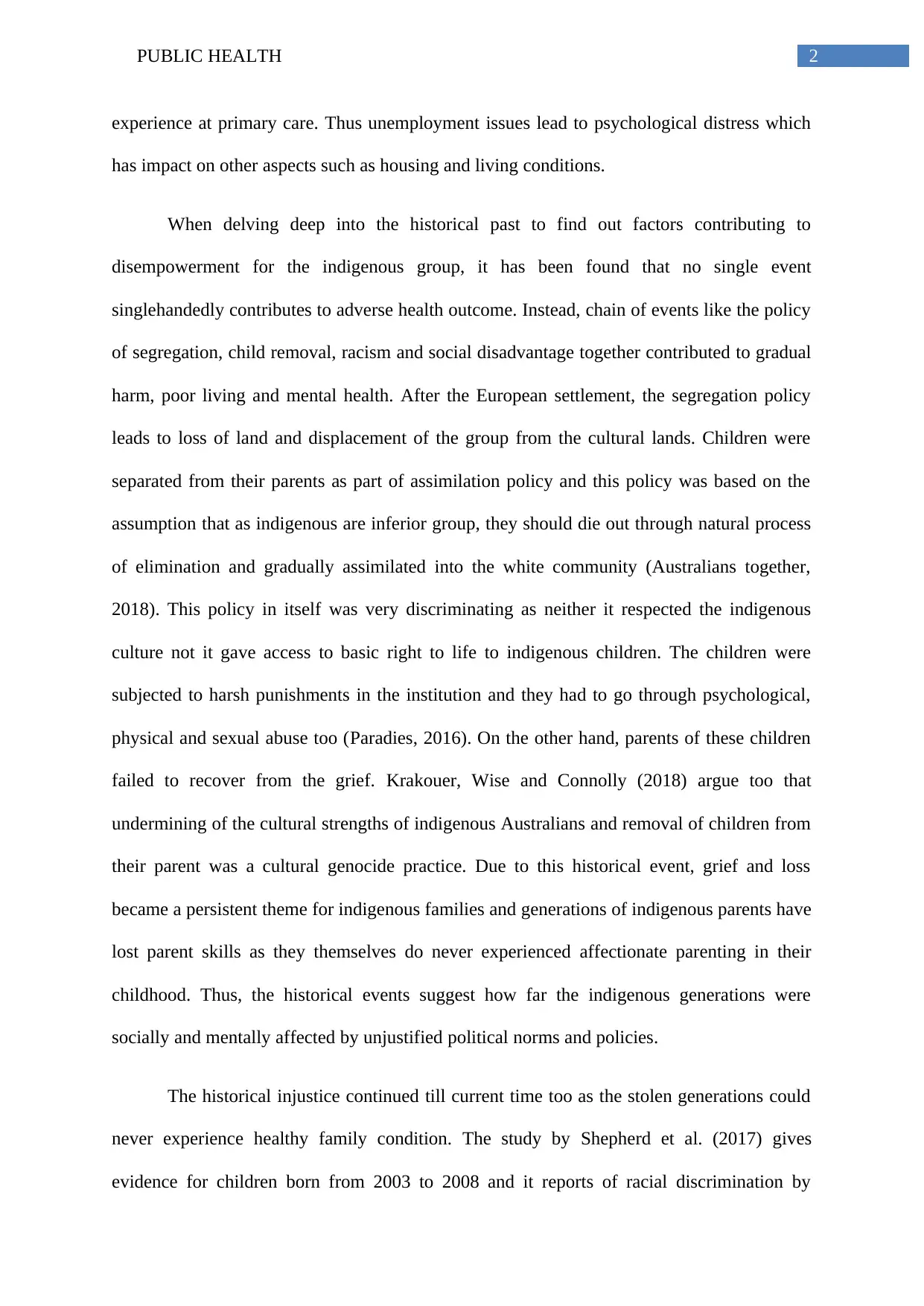
2PUBLIC HEALTH
experience at primary care. Thus unemployment issues lead to psychological distress which
has impact on other aspects such as housing and living conditions.
When delving deep into the historical past to find out factors contributing to
disempowerment for the indigenous group, it has been found that no single event
singlehandedly contributes to adverse health outcome. Instead, chain of events like the policy
of segregation, child removal, racism and social disadvantage together contributed to gradual
harm, poor living and mental health. After the European settlement, the segregation policy
leads to loss of land and displacement of the group from the cultural lands. Children were
separated from their parents as part of assimilation policy and this policy was based on the
assumption that as indigenous are inferior group, they should die out through natural process
of elimination and gradually assimilated into the white community (Australians together,
2018). This policy in itself was very discriminating as neither it respected the indigenous
culture not it gave access to basic right to life to indigenous children. The children were
subjected to harsh punishments in the institution and they had to go through psychological,
physical and sexual abuse too (Paradies, 2016). On the other hand, parents of these children
failed to recover from the grief. Krakouer, Wise and Connolly (2018) argue too that
undermining of the cultural strengths of indigenous Australians and removal of children from
their parent was a cultural genocide practice. Due to this historical event, grief and loss
became a persistent theme for indigenous families and generations of indigenous parents have
lost parent skills as they themselves do never experienced affectionate parenting in their
childhood. Thus, the historical events suggest how far the indigenous generations were
socially and mentally affected by unjustified political norms and policies.
The historical injustice continued till current time too as the stolen generations could
never experience healthy family condition. The study by Shepherd et al. (2017) gives
evidence for children born from 2003 to 2008 and it reports of racial discrimination by
experience at primary care. Thus unemployment issues lead to psychological distress which
has impact on other aspects such as housing and living conditions.
When delving deep into the historical past to find out factors contributing to
disempowerment for the indigenous group, it has been found that no single event
singlehandedly contributes to adverse health outcome. Instead, chain of events like the policy
of segregation, child removal, racism and social disadvantage together contributed to gradual
harm, poor living and mental health. After the European settlement, the segregation policy
leads to loss of land and displacement of the group from the cultural lands. Children were
separated from their parents as part of assimilation policy and this policy was based on the
assumption that as indigenous are inferior group, they should die out through natural process
of elimination and gradually assimilated into the white community (Australians together,
2018). This policy in itself was very discriminating as neither it respected the indigenous
culture not it gave access to basic right to life to indigenous children. The children were
subjected to harsh punishments in the institution and they had to go through psychological,
physical and sexual abuse too (Paradies, 2016). On the other hand, parents of these children
failed to recover from the grief. Krakouer, Wise and Connolly (2018) argue too that
undermining of the cultural strengths of indigenous Australians and removal of children from
their parent was a cultural genocide practice. Due to this historical event, grief and loss
became a persistent theme for indigenous families and generations of indigenous parents have
lost parent skills as they themselves do never experienced affectionate parenting in their
childhood. Thus, the historical events suggest how far the indigenous generations were
socially and mentally affected by unjustified political norms and policies.
The historical injustice continued till current time too as the stolen generations could
never experience healthy family condition. The study by Shepherd et al. (2017) gives
evidence for children born from 2003 to 2008 and it reports of racial discrimination by
⊘ This is a preview!⊘
Do you want full access?
Subscribe today to unlock all pages.

Trusted by 1+ million students worldwide
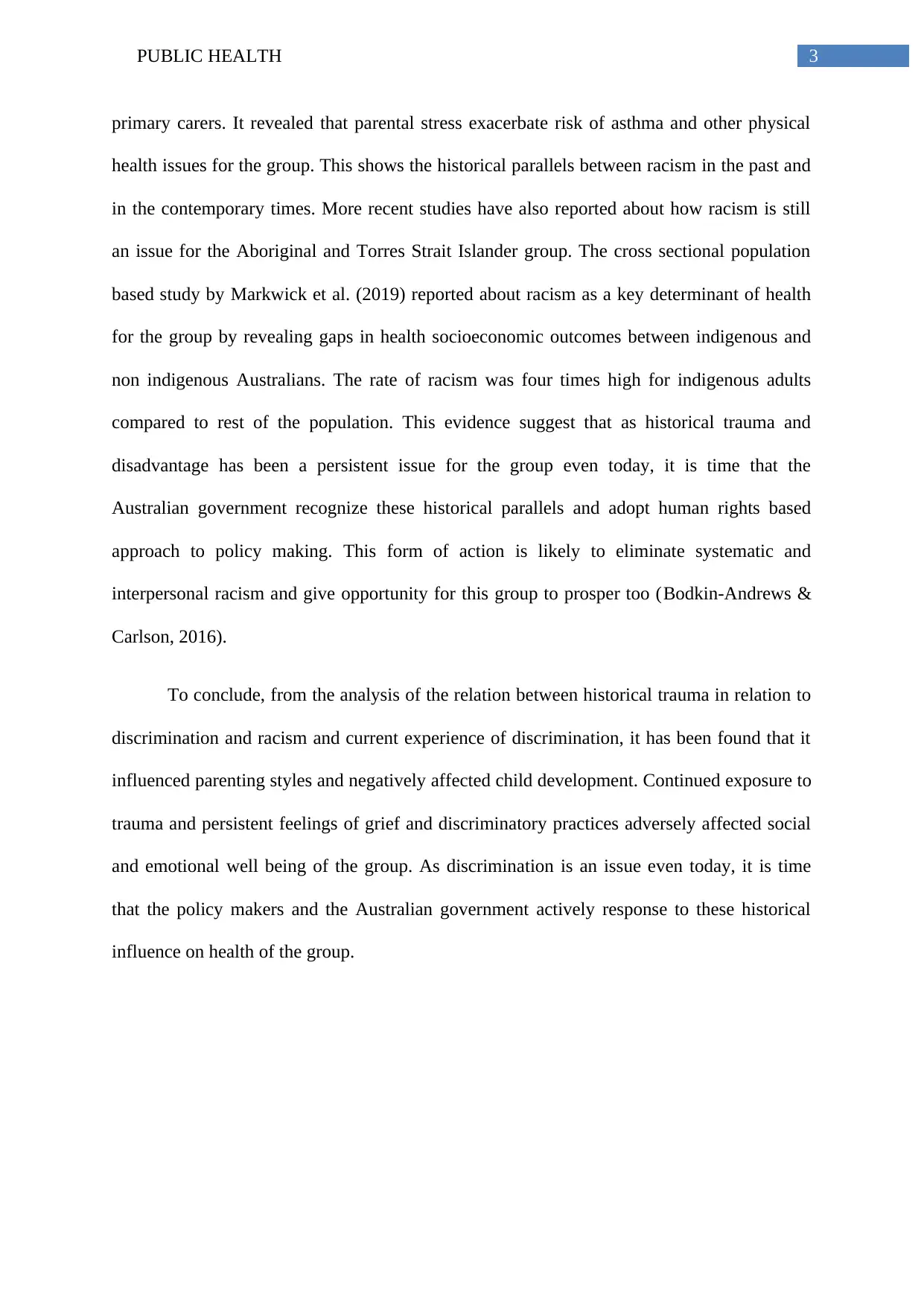
3PUBLIC HEALTH
primary carers. It revealed that parental stress exacerbate risk of asthma and other physical
health issues for the group. This shows the historical parallels between racism in the past and
in the contemporary times. More recent studies have also reported about how racism is still
an issue for the Aboriginal and Torres Strait Islander group. The cross sectional population
based study by Markwick et al. (2019) reported about racism as a key determinant of health
for the group by revealing gaps in health socioeconomic outcomes between indigenous and
non indigenous Australians. The rate of racism was four times high for indigenous adults
compared to rest of the population. This evidence suggest that as historical trauma and
disadvantage has been a persistent issue for the group even today, it is time that the
Australian government recognize these historical parallels and adopt human rights based
approach to policy making. This form of action is likely to eliminate systematic and
interpersonal racism and give opportunity for this group to prosper too (Bodkin-Andrews &
Carlson, 2016).
To conclude, from the analysis of the relation between historical trauma in relation to
discrimination and racism and current experience of discrimination, it has been found that it
influenced parenting styles and negatively affected child development. Continued exposure to
trauma and persistent feelings of grief and discriminatory practices adversely affected social
and emotional well being of the group. As discrimination is an issue even today, it is time
that the policy makers and the Australian government actively response to these historical
influence on health of the group.
primary carers. It revealed that parental stress exacerbate risk of asthma and other physical
health issues for the group. This shows the historical parallels between racism in the past and
in the contemporary times. More recent studies have also reported about how racism is still
an issue for the Aboriginal and Torres Strait Islander group. The cross sectional population
based study by Markwick et al. (2019) reported about racism as a key determinant of health
for the group by revealing gaps in health socioeconomic outcomes between indigenous and
non indigenous Australians. The rate of racism was four times high for indigenous adults
compared to rest of the population. This evidence suggest that as historical trauma and
disadvantage has been a persistent issue for the group even today, it is time that the
Australian government recognize these historical parallels and adopt human rights based
approach to policy making. This form of action is likely to eliminate systematic and
interpersonal racism and give opportunity for this group to prosper too (Bodkin-Andrews &
Carlson, 2016).
To conclude, from the analysis of the relation between historical trauma in relation to
discrimination and racism and current experience of discrimination, it has been found that it
influenced parenting styles and negatively affected child development. Continued exposure to
trauma and persistent feelings of grief and discriminatory practices adversely affected social
and emotional well being of the group. As discrimination is an issue even today, it is time
that the policy makers and the Australian government actively response to these historical
influence on health of the group.
Paraphrase This Document
Need a fresh take? Get an instant paraphrase of this document with our AI Paraphraser
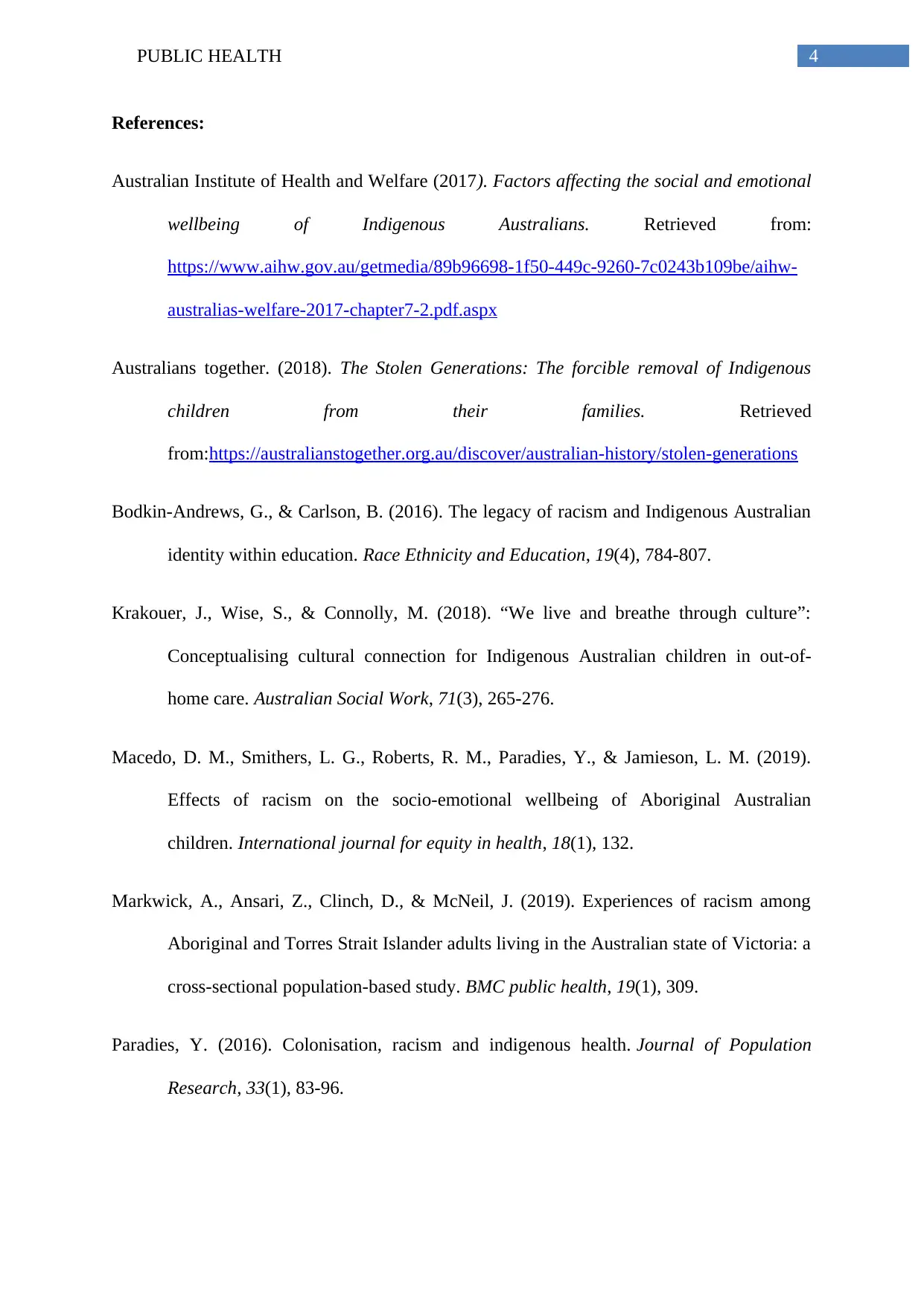
4PUBLIC HEALTH
References:
Australian Institute of Health and Welfare (2017). Factors affecting the social and emotional
wellbeing of Indigenous Australians. Retrieved from:
https://www.aihw.gov.au/getmedia/89b96698-1f50-449c-9260-7c0243b109be/aihw-
australias-welfare-2017-chapter7-2.pdf.aspx
Australians together. (2018). The Stolen Generations: The forcible removal of Indigenous
children from their families. Retrieved
from:https://australianstogether.org.au/discover/australian-history/stolen-generations
Bodkin-Andrews, G., & Carlson, B. (2016). The legacy of racism and Indigenous Australian
identity within education. Race Ethnicity and Education, 19(4), 784-807.
Krakouer, J., Wise, S., & Connolly, M. (2018). “We live and breathe through culture”:
Conceptualising cultural connection for Indigenous Australian children in out-of-
home care. Australian Social Work, 71(3), 265-276.
Macedo, D. M., Smithers, L. G., Roberts, R. M., Paradies, Y., & Jamieson, L. M. (2019).
Effects of racism on the socio-emotional wellbeing of Aboriginal Australian
children. International journal for equity in health, 18(1), 132.
Markwick, A., Ansari, Z., Clinch, D., & McNeil, J. (2019). Experiences of racism among
Aboriginal and Torres Strait Islander adults living in the Australian state of Victoria: a
cross-sectional population-based study. BMC public health, 19(1), 309.
Paradies, Y. (2016). Colonisation, racism and indigenous health. Journal of Population
Research, 33(1), 83-96.
References:
Australian Institute of Health and Welfare (2017). Factors affecting the social and emotional
wellbeing of Indigenous Australians. Retrieved from:
https://www.aihw.gov.au/getmedia/89b96698-1f50-449c-9260-7c0243b109be/aihw-
australias-welfare-2017-chapter7-2.pdf.aspx
Australians together. (2018). The Stolen Generations: The forcible removal of Indigenous
children from their families. Retrieved
from:https://australianstogether.org.au/discover/australian-history/stolen-generations
Bodkin-Andrews, G., & Carlson, B. (2016). The legacy of racism and Indigenous Australian
identity within education. Race Ethnicity and Education, 19(4), 784-807.
Krakouer, J., Wise, S., & Connolly, M. (2018). “We live and breathe through culture”:
Conceptualising cultural connection for Indigenous Australian children in out-of-
home care. Australian Social Work, 71(3), 265-276.
Macedo, D. M., Smithers, L. G., Roberts, R. M., Paradies, Y., & Jamieson, L. M. (2019).
Effects of racism on the socio-emotional wellbeing of Aboriginal Australian
children. International journal for equity in health, 18(1), 132.
Markwick, A., Ansari, Z., Clinch, D., & McNeil, J. (2019). Experiences of racism among
Aboriginal and Torres Strait Islander adults living in the Australian state of Victoria: a
cross-sectional population-based study. BMC public health, 19(1), 309.
Paradies, Y. (2016). Colonisation, racism and indigenous health. Journal of Population
Research, 33(1), 83-96.
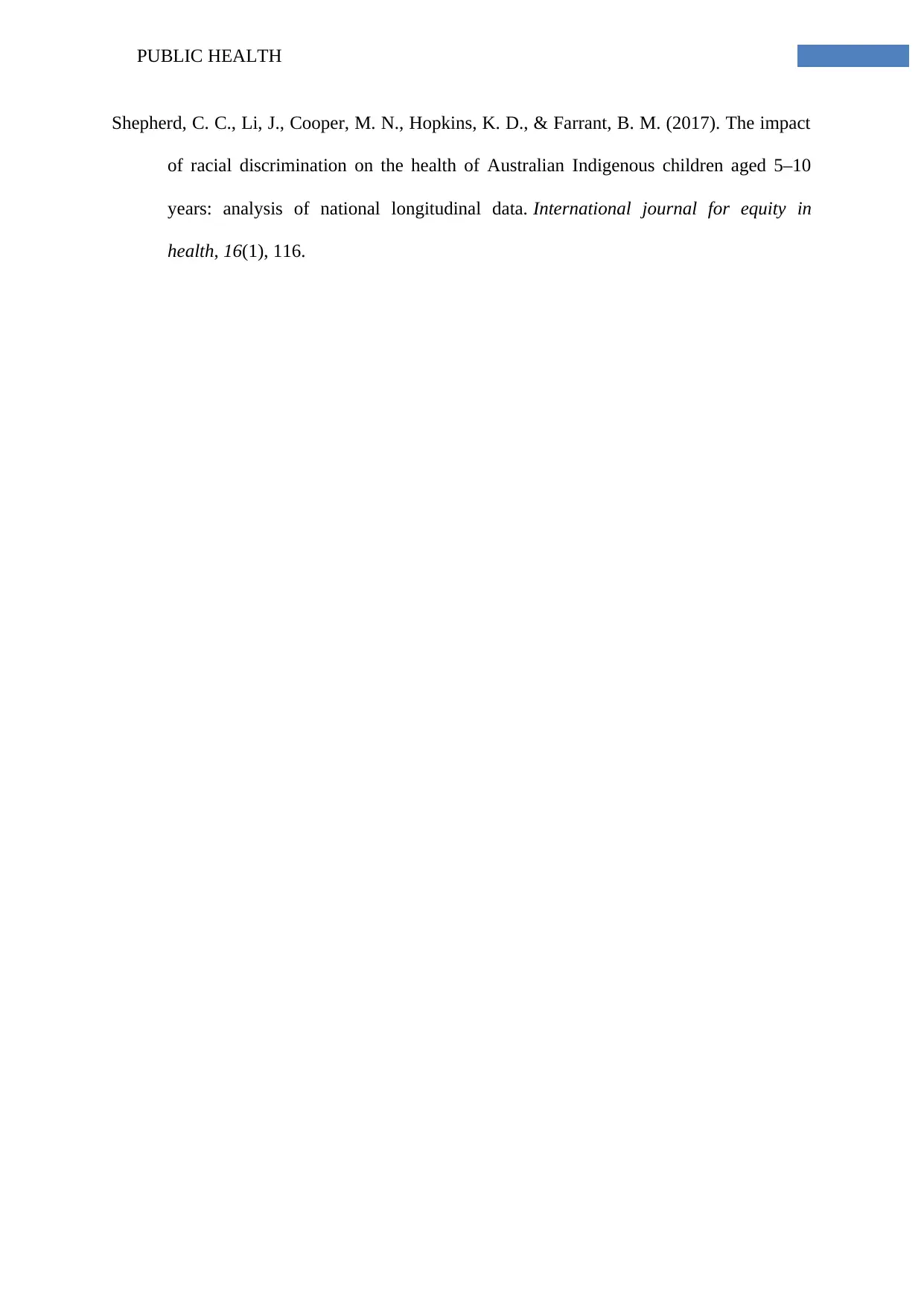
5PUBLIC HEALTH
Shepherd, C. C., Li, J., Cooper, M. N., Hopkins, K. D., & Farrant, B. M. (2017). The impact
of racial discrimination on the health of Australian Indigenous children aged 5–10
years: analysis of national longitudinal data. International journal for equity in
health, 16(1), 116.
Shepherd, C. C., Li, J., Cooper, M. N., Hopkins, K. D., & Farrant, B. M. (2017). The impact
of racial discrimination on the health of Australian Indigenous children aged 5–10
years: analysis of national longitudinal data. International journal for equity in
health, 16(1), 116.
⊘ This is a preview!⊘
Do you want full access?
Subscribe today to unlock all pages.

Trusted by 1+ million students worldwide

6PUBLIC HEALTH
1 out of 7
Related Documents
Your All-in-One AI-Powered Toolkit for Academic Success.
+13062052269
info@desklib.com
Available 24*7 on WhatsApp / Email
![[object Object]](/_next/static/media/star-bottom.7253800d.svg)
Unlock your academic potential
Copyright © 2020–2026 A2Z Services. All Rights Reserved. Developed and managed by ZUCOL.





